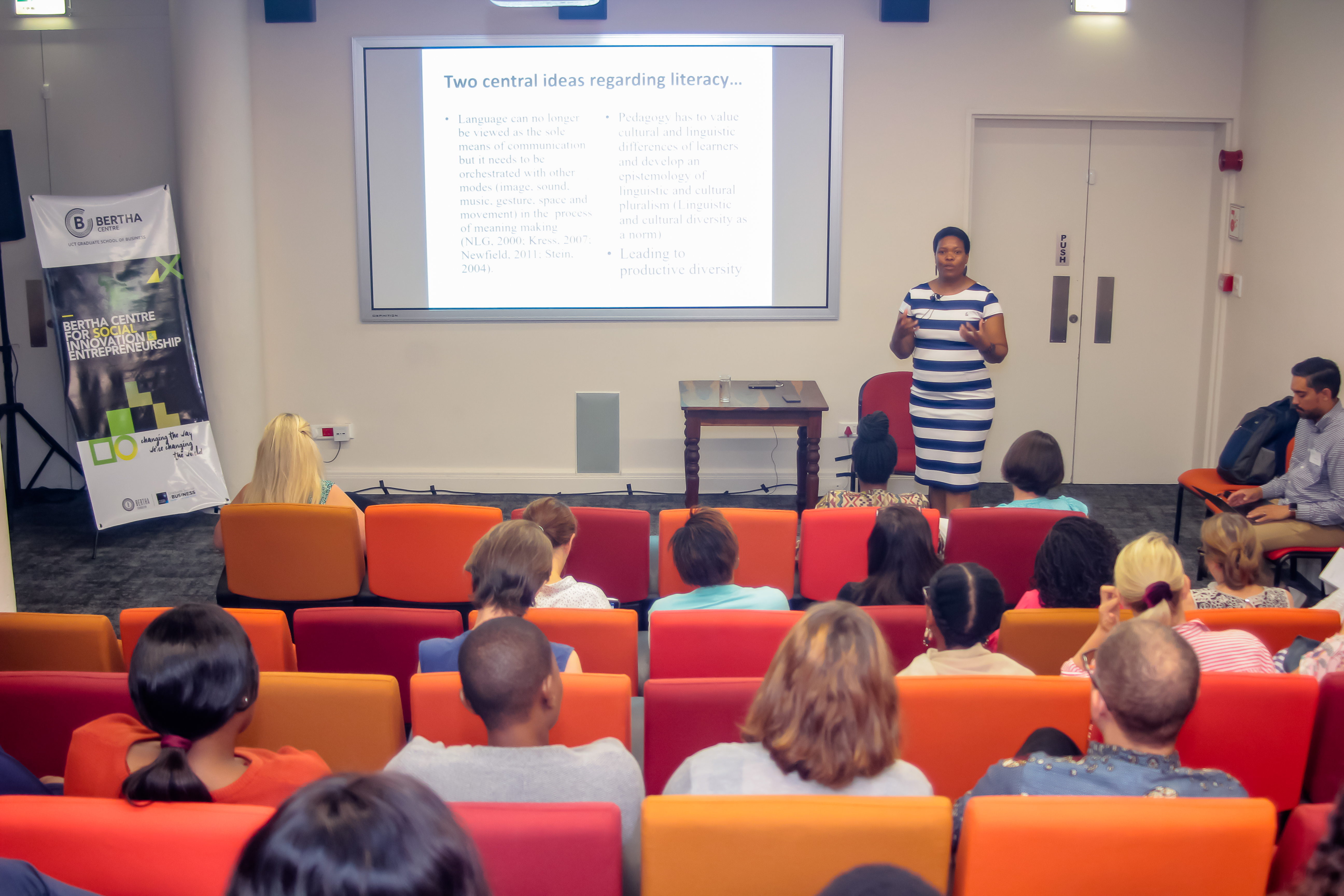Advancing Social Innovation
Catalysts for Social and Economic Change
Education Innovations & Youth
Knowledge for Impact Series
The Bertha Centre convenes multiple stakeholders along a certain theme once a quarter to disseminate the latest research and gather lessons from implementers to inform evidence-based decision making in education for greater impact and equality.
Conversations in the series to date
Knowledge for Impact Series Part 1: Everyday Activism
The stakeholders in the South African Education Community are often called upon to make their voices heard and activate for positive change in unjust conditions; but how? On 31 October 2019, a room full of these stakeholders came together at Tshisimani Centre for Activist Education to discuss the need for everyday activism and the different parts stakeholders can play to achieve this change. The panel of speakers shared what can be done by learners, parents, school leaders and organisations supporting education, beyond the well-established narrative of protest action and large campaigns, to become change agents. The conversation highlighted the importance of creating an environment of democracy and critical agency in our schools, leadership of self, the role of School Governing Bodies, and the fostering of critical hope.
Knowledge for Impact Series Part 2: Developing Multiliteracies in a Multilingual Country
This session was hosted in partnership with Ms Xolisa Guzula, a lecturer in multilingual and multiliteracies education at the University of Cape Town. She is interested in language and literacy such as social practice, biliteracy development, emergent literacy, critical literacies, multimodality, third spaces and bilingual children’s literature. The high failure and dropout rate in South Africa are, in part, linked to the widespread sudden transition to monolingual English education after only three years of formal schooling in the Home Languages, as well as to the narrow skills-based conception of literacy and pedagogy. South Africa has 12 official languages – including sign language – but this is simply not reflected in our classrooms beyond Grade 3. Painfully, our country’s children are often positioned as deficient English monolinguals rather than resourceful bilingual learners. This conversation focused on the need for this to be addressed as a learning and social justice imperative to recognise, celebrate and build on the resource of learners’ diversity.
In the media:\ Newspaper: Multilingual classrooms boost learningRadio: How do we boost multi lingual classroom learning

Knowledge for Impact Series Part 3: Responding to Racism in Schools
The Bertha Centre, in partnership with Shikaya and Facing History and Ourselves, hosted a live discussion with Lovelyn Nwadeyi, Dylan Wray and Kehiloe Ntsekhe for schools and the broader education community in order to facilitate sharing input on the deep hurt and frustration shared by learners in schools across South Africa.
Knowledge for Impact Series Part 4: Education in the time of COVID-19: Measuring, communicating and innovating in uncertain times - November 2020 Webinar
In light of the concomitant uncertainty amidst the national COVID-19 lockdown, many education organisations have had to halt or change many of their programmes and are struggling to plan ahead. As Bertha Centre’s Education Innovation portfolio, we wanted to gather and share some input to support the continued delivery of a quality offering in the months leading into the new academic year for a fatigued education community. The input was along three key themes:
- Keep measuring the impact of your organisations when activities may have changed, with Dr Sarah Chapman – Director of the Institute for Monitoring and Evaluation at the University of Cape Town
- Keep communicating with your stake holders to retain and even grow relationships, with Mr Mabine Seabe – Co-founder and Director of Stratagem Consultants and recognised as one of Avance Media's 100 Most Influential South Africans
- Keep innovating as you employ adaptive leadership in response to the changing environment, with Dr Rooksana Rajab – Director of Resonance Consulting Services and former driving Project Lead of the National Association of Social Change Entities in Education (NASCEE)
We were delighted with the diverse group of attendees from social-purpose and funding organisations. The Education Innovation Portfolio partnered with the Innovative Finance Portfolio within a multi-week learning series, supported by JET Education Services, Impact Investing South Africa and the Standard Bank Tutuwa Community Foundation.
Sign up for the Bertha Centre education newsletter if you would like to be invited to the next Knowledge for Impact session.